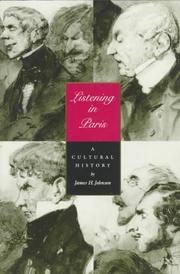| Listing 1 - 2 of 2 |
Sort by
|

ISBN: 0585249733 0520918231 9780520918238 9780585249735 0520085647 0520206487 Year: 1996 Volume: 21 Publisher: Berkeley, Calif. University of California Press
Abstract | Keywords | Export | Availability | Bookmark
 Loading...
Loading...Choose an application
- Reference Manager
- EndNote
- RefWorks (Direct export to RefWorks)
Beginning with the simple question, "Why did audiences grow silent?" Listening in Paris gives a spectator's-eye view of opera and concert life from the Old Regime to the Romantic era, describing the transformation in musical experience from social event to profound aesthetic encounter. James H. Johnson recreates the experience of audiences during these rich decades with brio and wit. Woven into the narrative is an analysis of the political, musical, and aesthetic factors that produced more engaged listening. Johnson shows the gradual pacification of audiences from loud and unruly listeners to the attentive public we know today. Drawing from a wide range of sources--novels, memoirs, police files, personal correspondence, newspaper reviews, architectural plans, and the like--Johnson brings the performances to life: the hubbub of eighteenth-century opera, the exuberance of Revolutionary audiences, Napoleon's musical authoritarianism, the bourgeoisie's polite consideration. He singles out the music of Gluck, Haydn, Rossini, and Beethoven as especially important in forging new ways of hearing. This book's theoretical edge will appeal to cultural and intellectual historians in many fields and periods.
Music --- Music appreciation. --- Music appreciation --- Music, Dance, Drama & Film --- Music History & Criticism, General --- Analytical guides (Music) --- Appreciation of music --- Musical appreciation --- Musical analysis --- Music and society --- History and criticism. --- Social aspects. --- History and criticism --- Social aspects --- Analysis, appreciation --- Analytical guides --- Appreciation --- Instruction and study --- 18th century opera. --- aesthetic factors. --- attentive audience. --- beethoven. --- concert life. --- concerts. --- cultural history. --- engaged listening. --- entertainment. --- gluck. --- gradual pacification. --- haydn. --- hearing. --- imitation. --- intellectual history. --- jacobin ideology. --- musical authoritarianism. --- musical experience. --- napoleon. --- old regime. --- opera. --- paris. --- polite consideration. --- political factors. --- public concerns. --- respectability. --- revolutionary audiences. --- romantic era. --- romanticism. --- rossini. --- social duty. --- studies on the history of society and culture. --- thermidor.

ISBN: 0585047871 0520920945 9780520920941 9780585047874 0520088948 Year: 1996 Publisher: Berkeley University of California Press
Abstract | Keywords | Export | Availability | Bookmark
 Loading...
Loading...Choose an application
- Reference Manager
- EndNote
- RefWorks (Direct export to RefWorks)
Enlivened and enriched by Auslander's experiences as a cabinetmaker, this pathbreaking work demonstrates that in post-Revolutionary France, furniture and consumer goods became newly important means of constituting selves, social class, and, perhaps most significantly, the economy and society of the nation itself. The very style of the goods reflected these preoccupations: nineteenth-century bourgeois style was dominated by gendered versions of Old Regime-style furniture, while the working class was offered new furniture designed specifically for its needs. Tastemaking took on a sudden urgency, reflected in the creation of new schools, museums, expositions, libraries, magazines, and books designed to "improve" the taste of producers and consumers alike. As these institutions competed with furniture sellers, a fierce competition sprang up among government bureaucrats, private philanthropists, and distributors to control workers' and consumers' taste. Auslander melds the history of high politics - the formation of the state - with the history of the mundane - furniture - in order to examine how power was consolidated, reproduced, and even resisted in the small objects and gestures of everyday life in France.
Furniture --- Social change --- Politics and culture --- Wood furniture --- Wooden furniture --- Decoration and ornament --- Decorative arts --- House furnishings --- Cabinetwork --- Interior decoration --- Upholstery --- Styles --- Social aspects --- France --- Civilization. --- Politics and government --- Social change. --- Change, Social --- Cultural change --- Cultural transformation --- Societal change --- Socio-cultural change --- Social history --- Social evolution --- 19th century french culture. --- 19th century french society. --- absolutism. --- aesthetics. --- bourgeois style. --- cabinetmaker. --- consumer culture. --- consumer goods. --- european history. --- france. --- french revolution. --- french society. --- furniture sellers. --- furniture. --- gendered furniture. --- modern france. --- monarchical power. --- national economy. --- old regime style furniture. --- post revolutionary france. --- power. --- productive labor. --- representation. --- social class. --- state formation. --- studies on the history of society and culture. --- style. --- taste making.
| Listing 1 - 2 of 2 |
Sort by
|

 Search
Search Feedback
Feedback About UniCat
About UniCat  Help
Help News
News